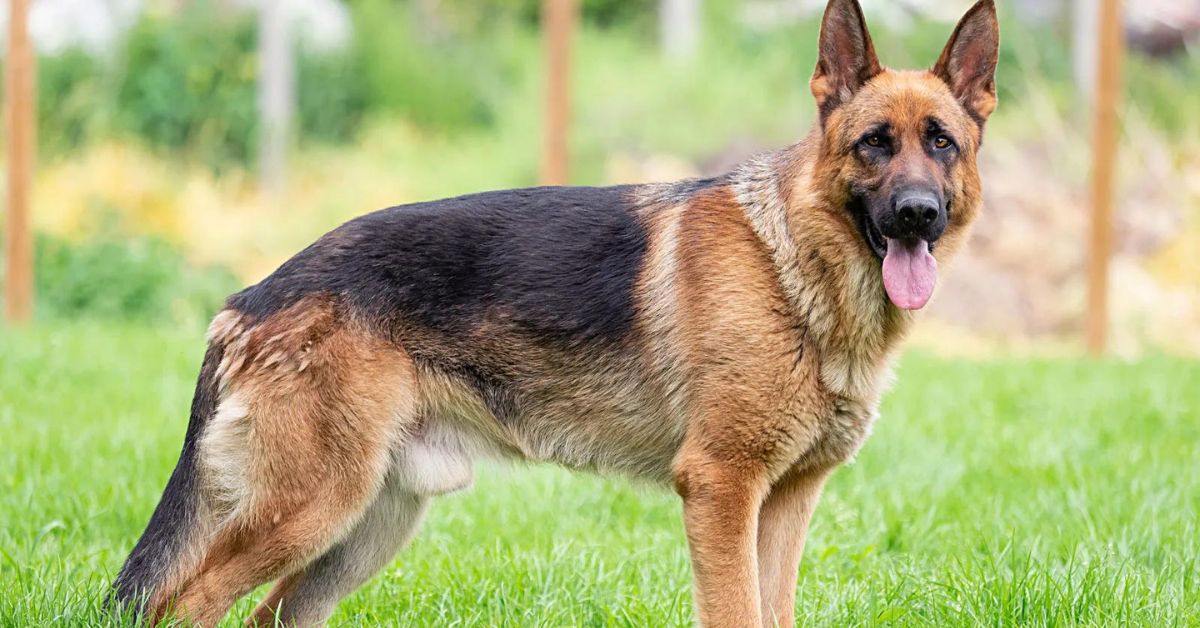German Shepherds, also known as Alsatians, are a popular breed of working dogs known for their intelligence, loyalty, and versatility. They are highly regarded for their roles as police dogs, service animals, search and rescue dogs, and loyal companions.
In this comprehensive guide, we will explore everything you need to know about German Shepherds, including their history, physical characteristics, temperament, training needs, health considerations, and more.
Everything About German Shepherd
History of German Shepherd
The history of the German Shepherd dates back to the late 19th century in Germany. Captain Max von Stephanitz is considered the father of the breed, as he played a pivotal role in its development. He aimed to create a versatile working dog that possessed intelligence, agility, and loyalty.
Von Stephanitz began by carefully selecting and breeding shepherd dogs that exhibited the desired traits. His goal was to create a breed that excelled in herding and guarding livestock. In 1899, he founded the Verein für Deutsche Schäferhunde (German Shepherd Dog Association) to promote the breed and establish breed standards.
German Shepherds gained recognition for their exceptional working abilities, and their popularity quickly spread beyond Germany. During World War I, they served as messenger dogs, rescue dogs, and sentries. Their intelligence and trainability made them invaluable in various military and police roles.
Today, German Shepherds continue to excel in a wide range of tasks, including police work, search and rescue operations, therapy and service work, and as loyal family companions. Their impressive history and versatility have made them one of the most popular and respected dog breeds worldwide.
Appearance of German Shepherd
German Shepherds are known for their distinctive and noble appearance. They are large, muscular dogs with a well-proportioned body. The breed standard emphasizes a strong and agile build. They typically stand between 22 to 26 inches (56 to 66 cm) at the shoulder and weigh between 50 to 90 pounds (23 to 41 kg).
German Shepherds have a graceful yet powerful gait, showcasing their athleticism. They have a strong, elongated neck, and their head is proportionate to their body, with a slightly domed forehead. Their expressive eyes are usually brown, and their ears are erect and pointed.
One of the most recognizable features of German Shepherds is their double coat. The outer coat is dense, straight, and harsh, providing protection from various weather conditions. The undercoat is thick and plush, providing insulation. German Shepherds come in various colors, but the most common are black and tan, sable, and black.
German Shepherd Temperament and Activities
German Shepherds have a temperament that is renowned for its intelligence, loyalty, and versatility. They are highly trainable and excel in a variety of activities and roles. Here are some key aspects of their temperament and preferred activities:
Intelligent and Obedient: German Shepherds are exceptionally intelligent and quick learners. They are eager to please their owners, making them highly trainable in obedience, agility, and advanced tasks.
Loyal and Protective: German Shepherds are known for their unwavering loyalty to their families. They are naturally protective and make excellent guard dogs. Proper socialization is important to ensure they remain friendly towards strangers while maintaining their protective instincts.
Energetic and Active: German Shepherds have high energy levels and require regular exercise to stay physically and mentally stimulated. They thrive in activities such as long walks, jogging, hiking, and playing fetch. Engaging them in structured activities helps prevent behavioral problems arising from boredom or pent-up energy.
Working and Service Roles: German Shepherds have a long history of working roles and are commonly employed in law enforcement, search and rescue, and service work. Their intelligence, focus, and trainability make them ideal for these demanding tasks.
Family Companions: Despite their working heritage, German Shepherds can also be loving and gentle family companions. They form strong bonds with their owners and are generally good with children when properly socialized from an early age.
German Shepherd Health Issues
Like all dog breeds, German Shepherds are prone to certain health issues. While not all German Shepherds will experience these conditions, it’s important to be aware of potential health concerns. Here are some common health issues associated with the breed.
Hip and Elbow Dysplasia: German Shepherds are susceptible to hip and elbow dysplasia, which are developmental abnormalities in the joints. These conditions can lead to pain, lameness, and arthritis.
Degenerative Myelopathy (DM): DM is a progressive disease that affects the spinal cord, resulting in hind limb weakness and paralysis. It is more commonly seen in older German Shepherds.
Bloat: German Shepherds can be prone to bloat or gastric dilatation-volvulus (GDV), which is a life-threatening condition where the stomach twists. Immediate veterinary attention is crucial if bloat is suspected.
Allergies: German Shepherds may develop allergies, including food allergies or environmental allergies. Common symptoms include itching, rashes, and ear infections.
Exocrine Pancreatic Insufficiency (EPI): EPI is a condition where the pancreas fails to produce enough digestive enzymes, leading to malnutrition and weight loss. It can be managed with enzyme supplements.
German Shepherd Care Tips
Proper care is essential to ensure the well-being of your German Shepherd. Here are some important care tips to keep in mind:
Exercise and Mental Stimulation: German Shepherds are active dogs that require regular exercise to stay physically fit and mentally stimulated. Aim for daily walks, play sessions, and interactive toys to keep them engaged.
Training and Socialization: Early obedience training and socialization are crucial for German Shepherds. Start training from a young age, using positive reinforcement techniques. Proper socialization helps them become well-rounded, confident dogs.
Healthy Diet: Feed your German Shepherd a balanced diet formulated for their specific needs. Consult with your veterinarian to determine the appropriate portion sizes and dietary requirements for your dog’s age, weight, and activity level.
Grooming: German Shepherds have a dense double coat that requires regular brushing to remove loose hair and prevent matting. They typically shed heavily twice a year, requiring more frequent brushing during those times.
Veterinary Care: Schedule regular check-ups with a veterinarian for vaccinations, preventive care, and routine health exams. Discuss parasite prevention, dental care, and any specific health concerns related to the breed.
Loving Environment: German Shepherds thrive on human companionship and need to feel like a valued member of the family. Provide them with love, attention, and a safe, comfortable living environment.
German Shepherd Lifespan
The average lifespan of a German Shepherd is typically around 9 to 13 years. However, it’s important to note that individual lifespans can vary depending on various factors such as genetics, overall health, diet, exercise, and quality of care. Providing a nutritious diet, regular exercise, proper veterinary care, and a loving environment can contribute to a longer and healthier life for your German Shepherd.
German Shepherd Maintenance Cost
The maintenance cost of a German Shepherd can vary based on several factors, including location, quality of care, and individual needs. Here are some common expenses to consider:
Food: German Shepherds require a high-quality diet to meet their nutritional needs. The cost of dog food can range from ₹2,000 to ₹4,000 per month ($30 to $60).
Veterinary Care: Regular check-ups, vaccinations, preventive medications, and potential medical treatments are necessary for the health of your German Shepherd. Annual veterinary expenses can range from ₹5,000 to ₹15,000 ($75 to $225) or more, depending on the services required.
Grooming: German Shepherds have a double coat that requires regular brushing and occasional professional grooming. Budget around ₹1,500 to ₹3,000 ($20 to $45) per grooming session.
Training and Socialization: Professional training classes or private sessions may be beneficial for your German Shepherd’s obedience and socialization. Prices for training can vary, but expect to pay around ₹10,000 to ₹20,000 ($150 to $300) for a basic training course.
Toys, Accessories, and Miscellaneous: Additional expenses may include toys, bedding, leashes, collars, and other accessories. These costs can vary depending on your preferences and the quality of products you choose.
Grooming for German Shepherd
Grooming plays a crucial role in maintaining the health and appearance of a German Shepherd. Here are some grooming tips specific to German Shepherds:
Brushing: German Shepherds have a double coat that sheds year-round and heavily twice a year. Regular brushing helps remove loose hair, prevents matting, and keeps their coat in good condition. Use a slicker brush or undercoat rake to remove dead hair, paying extra attention to areas like the neck, back, and hindquarters.
Bathing: German Shepherds generally require bathing every 6 to 8 weeks or as needed. Use a dog-specific shampoo and thoroughly rinse to remove all residue. Be cautious not to over-bathe, as excessive washing can strip the natural oils from their coat, leading to dryness and skin issues.
Nail Care: Trim your German Shepherd’s nails regularly to prevent them from becoming too long. Long nails can cause discomfort or difficulty walking. Use a dog nail trimmer and be careful not to cut into the quick, which is the sensitive part of the nail.
Ear Cleaning: Check and clean your German Shepherd’s ears regularly to prevent infections. Use a dog ear cleaner and gently wipe the outer part of the ear with a soft cloth or cotton ball. Avoid inserting anything into the ear canal.
Dental Care: Dental hygiene is important for a German Shepherd’s overall health. Brush their teeth regularly using a dog-specific toothbrush and toothpaste to prevent tartar buildup and gum disease. Dental chews and regular veterinary dental check-ups can also help maintain oral health.
Professional Grooming: While regular brushing is usually sufficient, some German Shepherds may benefit from occasional professional grooming. Professional groomers can provide services like trimming the nails, cleaning the ears, and giving the coat a thorough cleaning and trimming if desired.
Facts about German Shepherd
- German Shepherds are one of the most popular dog breeds in the world.
- They were originally bred for herding and guarding livestock.
- German Shepherds are highly intelligent and easily trainable.
- They are known for their loyalty and make excellent family companions.
- German Shepherds have a strong work ethic and are often used in police and military roles.
- They have a distinctive double coat that requires regular brushing.
- German Shepherds are known for their protective nature and make excellent guard dogs.
- They are active dogs that require regular exercise to stay happy and healthy.
- German Shepherds are highly versatile and can excel in various activities, including agility, obedience, and search and rescue.
- They have a life span of around 9 to 13 years on average.
Frequently Asked Questions
Are German Shepherds good with children?
Yes, German Shepherds can be good with children when properly socialized and trained from an early age. They are generally protective and loyal to their family members, including children.
Do German Shepherds shed a lot?
Yes, German Shepherds have a dense double coat that sheds year-round and heavily twice a year. Regular brushing can help manage shedding and keep their coat healthy.
Are German Shepherds aggressive?
German Shepherds, like any breed, can show aggression if not properly trained, socialized, or treated. With proper training, socialization, and responsible ownership, German Shepherds are typically well-behaved and loyal.
Can German Shepherds live in apartments?
While German Shepherds are a large breed, they can adapt to apartment living if given sufficient exercise and mental stimulation. However, they thrive best in homes with access to a yard or ample outdoor space.
Can German Shepherds live in hot climates?
German Shepherds can adapt to hot climates, but precautions should be taken to ensure they have access to shade, fresh water, and are not exposed to excessive heat for prolonged periods. Proper ventilation and avoiding strenuous exercise during the hottest parts of the day are also important.


